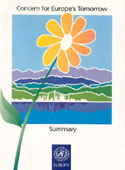Concern for Europe's tomorrow. Summary

Download
WHO Regional Publications, European Series, No. 53
1994, viii + 88 pages
ISBN 92 890 1317 6
This publication is only available online.
People are increasingly concerned about the state of the environment and its effect on their health and wellbeing. They know of examples, throughout the European Region, of unacceptable levels of pollution, inadequate drinking-water and sewage facilities, uncontrolled dumping of waste and occasionally major man-made disasters. But what is the situation?
Concern for Europe's Tomorrow is a major Region-wide project, launched in 1991 to find out. The report that resulted is the most comprehensive survey of environmental health ever carried out in Europe. For the first time, information has been assembled from almost all the 50 Member States of the Region. This summary sketches the picture that has begun to emerge. First, it identifies the major diseases and conditions affecting the European population that are linked in some way to environmental conditions. It goes on to review the population's exposure to specific environmental hazards. It then summarizes the estimated exposure of the population and likely health effects, often extrapolated from individual studies. Major gaps in data remain, but these show the direction research must take. The main areas of concern are microbiological contamination of food and drinking-water and urban air pollution. Over 100 million people, largely in central and eastern parts of the Region, lack safe drinking-water, while people everywhere suffer increasingly from illness caused by contaminated food. Hot spots of urban air pollution persist in some industrial areas. The inexorable increase in road traffic not only contributes to air pollution, but is a major cause of death and injury among young people and through noise and congestion detracts considerably from the quality of city life. Rapid urbanization in the south and inner city decay in the west, with inadequate housing conditions and homelessness, exacerbate these urban problems.
The implications of some transboundary issues, such as acid deposition and the pollution of river basins, are of obvious concern. But if the people of the Region share a common concern for Europe's tomorrow they must also tackle the global problems of possible climate change, resulting from the generation of green-house gases, and ozone depletion by chlorofluorocarbons, now. The countries of the Region, from Greenland to the Pacific coast of the Russian Federation, can and must work together to tackle these issues before it is too late. This summary makes recommendations about how they can do so.



